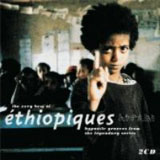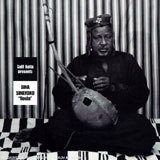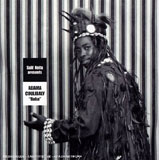Home » Jazz Articles » African Jazz » Ethiopia: The Last Days of Ras Tafari & Mali: Salif Keit...
Ethiopia: The Last Days of Ras Tafari & Mali: Salif Keita Launches Wanda Label
 Various Artists
Various Artists
The Very Best Of Ethiopiques
Union Square Music
2007
Anyone familiar with the final days of the late Haile Selassie—aka Ras Tafari, King of Kings, the autocratic ruler of his country for 44 years until his overthrow in 1974—will remember the era as a bizarre, twentieth century-going-on-medieval cross between Lewis Carroll's Alice In Wonderland and Mervyn Peake's Gormenghast, a bad-acid fantasy world in which nothing, except the desperate poverty of most Ethiopians, was as it seemed. Later, Selassie's court was the subject of its own real-life fairytale in Ryszard Kapuscinski's The Emperor (Quartet Books, 1983), a brilliant portrayal of the administration in the months immediately before and after its downfall.
The Very Best Of Ethiopiques, mostly recorded between 1969-75, is the soundtrack of those times—an electro-acoustic mash-up of jazz, funk and traditional Ethiopian dance and ritual music as fantastical and dreamlike as the society out of which it grew. Totally sui generis, it sounds like something from another planet. Unless you already know the Ethiopiques series from which it is compiled, you really won't have heard anything like it before.
It is a near miracle that any of the records were made. Under the dead hand of the Selassie regime, Ethiopia's recording scene, such as it was, had pretty much ceased to exist by the mid-1960s. A monopoly over the production of records had, years before, been given by Imperial decree to a courtier whose disinterest and inactivity had progressively destroyed the business. But live music in Addis Ababa, Ethiopia's capital, was thriving—stimulated by records brought into the country by US peacekeeping troops and freed up by Selassie's loosening grip.
Enter a determined young music enthusiast named Amha Eshete. In 1969, anticipating correctly that the regime no longer had the will to enforce the recording monopoly, Eshete set up his own label. By 1975, when he was forced into exile by the odious military junta which replaced Selassie, Eshete had released around 250 lo-fi, but spectacularly vibrant, titles by local artists. Following Eshete's departure, the equally prolific, cassettes-only entrepreneur Ali Tango continued to document the scene. At the time, very few of Eshete or Tango's releases became available outside Ethiopia.
Now fast-forward a few decades, to Francis Falceto's Buda Musique label, which has set about archiving and re-releasing Eshete and Tango's work in its superb, labour of love Ethiopiques series. To date, 23 volumes have been released and more are promised.
Utterly bewitching, The Very Best Of Ethiopiques is a double-disc selection from the series, containing almost two hours of extraordinary music. Throaty, loping tenor saxophones dominate the line-ups, many of which also include electric keyboards and guitars, from the mutant hard bop, astral jazz and post-Bitches Brew fusion of Mula Astaqe, heard on four tracks, to the parallel-world free jazz of Getatchew Mekurya. A musical and physical giant, who wore animal skins and a lion's mane head-dress onstage, two of Mekurya's serpentine, Sonny Rollins-meets-Ornette Coleman discursions are included on the second disc. If, as is likely, you are entranced by what you hear, Ethiopiques 14: Getatchew Mekurya: The Negus Of Ethiopian Sax is devoted to his music.
Elsewhere, vocalists are centrestage. Some, like the iconic Tlahoun Gessesse and Mahmoud Ahmed (whose "Ere Mela Mela," the track which first stimulated European interest in modern Ethiopian music on its release by Brussels' Crammed Discs label in 1986, is included on the first disc), employ electric instruments within otherwise purely Ethiopian contexts. Others, like the traditional lyre players and singers Tewelde Redda and Alemu Aga, perform styles untouched by any European or American instrumentation or influence. A handful of tracks sound like tripped-out lounge jazz. One, Alemayehu Eshete's revved-up funk workout "Tchero Adari Negn," in which the singer's James Brown-inspired grunts actually sound more like he's throwing up, is gloriously kitsch.
And that is but to scratch the surface of this wonderful, paradigm shifting, five-star release. If you only listen to one African music album this year, make it The Very Best Of Ethiopiques.
 Sina Sinayoko
Sina Sinayoko
Boula
Wanda Records
2007
The Malian singer and world music star Salif Keita has increasingly foregrounded traditional Mandingo music in his own albums in recent years. Keita recently set up his own Wanda Records studio and label in Bamako, and the operation's first two releases document traditional Malian griot and donso (hunter) music.
Sina Sinayoko's Boula makes practically no concessions to overseas listeners other than the occasional, softly-spoken guitar playing of arranger Djely Moussa Kouyate. Sinayoko sings in a roughhewn but supple tenor, accompanied in the main by simbis (seven string harps), bolon (four string bass kora) and traditional percussion, with backing vocals by Keita's sisters Salimata, Diarra and Maimouna. Sadly, the dense yet rather unenlightening liner notes don't include translations of the lyrics, but the peaceful vibe of donso music—traditionally used to purify hunters before and after a trek—reaches out to the listener.
 Adama Coulibaly
Adama Coulibaly
Baba
Wanda Records
2007
At 37, Adama Coulibaly is about half Sinayoko's age, and his music, though fundamentally traditional, pays a passing nod to modernity. Djely Moussa Kouyate again created the arrangements and his guitar is heard more frequently. Relatively youthful vigor also colors the music, its faster tempo driven by the quietly insistent rhythms of karigan (metal scraper) player Mamadou Traore and calabash player Mamadou Kone Dit Prince. At the core of the music are Coulibaly's vocals, delivered in a strong tenor possessing a more urgent edge than Sinayoko's, and his virtuosic donso n'goni (six string lute) playing .
Coulibaly's album is the more engaging of the two Wanda sets, and stands up well enough alongside the recent masterpiece Segu Blue (Out Here, 2007) by Bassekou Kouyate, one of the late Malian guitarist Ali Farka Toure's first choice n'goni players.
Tracks and Personnel
The Very Best of Ethiopiques
Tracks: CD1: Tesfa Maryam Kidane: Heywete. Mulatu Astaqe: Yekermo Sew; Yekatit. Girma Beyene: Enken Yelebesh. Bahtu Gebre-Heywet: Ewnet Yet Lagegnesh. Mulatu Astaqe: Gubelye. Mahmoud Ahmed: Ere Mela Mela/Metche New. Alemayehu Eshete: Tcero Adari Negn; Telantena Zare. Wallias Band: Muziqawi Silt. Ayalew Mesfin & Black Lion Band: Gedawo. Tlahoun Gessesse: Tchuheten Betsemu. Menelik Wesnatchew: Tezeta. CD2: Tseque-Maryam Guebrou: Mother's Love. Tlahou-Gessesse: Sena. Tewelde Redda: Milenu. Beyene Habte: Embi Ila. Mulatu Astaqe: Tezeta. Girma Beyene: Set Alamenem. Muluqeu Mellesse & Dahlak Band: Bene Mote. Getatchew Mekurya: Antchi Hoye. Tlahoun Gessesse: Kulun Mankwalesh. Getatchew Mekurya: Shellela. Seyfu Yohannes: Mela Mela. Mahmoud Ahmed: Atawurulegn Lela; Festum Denq Ledj Nesh. Alemu Aga: Abatatchen Hoy (Pater Noster).
Personnel: see Tracks.
Boula
Tracks: Maramafin; Blas; Djadjon; Gedain; Sori I; Tandoura.
Personnel: Sina Sinayoko: lead vocal, simbi; Salimata Keita, Diarra Keita, Maimouna Keita: backing vocals; Abdoulaye Diabate: bolon; Djely Moussa Kouyate: guitars; Sina Sinayoko, Adama Coulibaly: simbi; Mamadou Kone Dit Prince: calebasse; Souleymane Doumbia: percussion.
Baba
Tracks: Salif & Adama; Marassa; Nteri; Nibedon; Noukououba; Ntalan; Sadjona; Sireba; Yadnukan; Baba; Gondron.
Personnel: Adama Coulibaly: lead vocal, donso n'goni; Madou Traore, Sekou Kante: backing vocals; Djely Moussa Kouyate: bolon, guitar; Mamadou Kone Dit Prince: calebasse; Mamadou Traore: karigan.
< Previous
Peace
Next >
Wonderful Discovery
Comments
Tags
For the Love of Jazz
 All About Jazz has been a pillar of jazz since 1995, championing it as an art form and, more importantly, supporting the musicians who create it. Our enduring commitment has made "AAJ" one of the most culturally important websites of its kind, read by hundreds of thousands of fans, musicians and industry figures every month.
All About Jazz has been a pillar of jazz since 1995, championing it as an art form and, more importantly, supporting the musicians who create it. Our enduring commitment has made "AAJ" one of the most culturally important websites of its kind, read by hundreds of thousands of fans, musicians and industry figures every month.


















